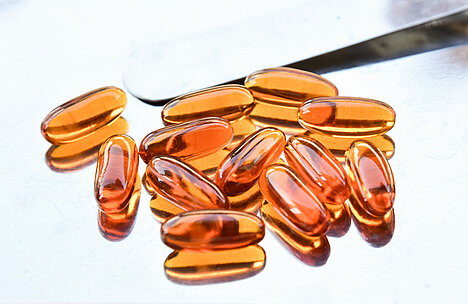Lecithin

What is lecithin?
Lecithin is a collective term for various phospholipids that play an important role in the cell membrane. Phospholipids are fat molecules that consist of a water-soluble head and a fat-soluble tail. They form a thin layer around the cells and protect them from external influences. They are also involved in various metabolic processes, such as the transport of fats in the blood.
Lecithin occurs naturally in many plant and animal foods, such as eggs, soy, sunflower seeds and liver. However, it can also be produced industrially and used as an additive in foods or as a dietary supplement.
What are the benefits of lecithin for dogs?
Lecithin has various positive effects on the health of dogs. Firstly, it can improve the digestion of fats by stimulating the formation of bile acid. Bile acid is a substance produced in the liver that breaks down fats in the intestine. If your dog has too little bile acid or eats too much fat, this can lead to digestive problems such as diarrhea or flatulence. Lecithin can help here by supporting the digestion of fat.
On the other hand, lecithin can strengthen the immune system by promoting the function of white blood cells. White blood cells are responsible for the defense against pathogens and can be activated by lecithin. This can help your dog to fight or prevent infections.
Lecithin can also protect the nervous system by promoting the formation of myelin. Myelin is a layer of fat and protein that surrounds and insulates the nerve fibers. This speeds up and improves the transmission of electrical signals in the brain and spinal cord. If your dog has too little myelin or it becomes damaged, this can lead to neurological disorders such as epilepsy or dementia. Lecithin can prevent this by supporting myelin formation.
What are the disadvantages of lecithin for dogs?
Lecithin is generally well tolerated by dogs and has no serious side effects. However, in some cases it can cause intolerances or allergies, especially if your dog is sensitive to soy. Soy is a common source of lecithin in supplements and can cause skin rashes, itching or gastrointestinal discomfort in some dogs. If you notice that your dog is showing such symptoms, you should stop the lecithin and consult a vet.
You should also make sure that you do not give your dog too much lecithin. An overdose of lecithin can lead to increased blood clotting, which can increase the risk of thrombosis or stroke. The recommended daily dose for dogs is around 50 to 100 milligrams per kilogram of body weight. You should therefore always read the package leaflet and follow the instructions of the manufacturer or your vet.
How can you give your dog lecithin?
There are various ways you can give your dog lecithin. The simplest is to offer him foods containing lecithin, such as eggs or liver. These not only contain lecithin, but also other valuable nutrients for your dog.
Another option is to give him food supplements containing lecithin. These are available in various forms, such as capsules, powder or liquid. You can either put them directly into your dog's mouth or mix them into their food. However, make sure that you choose a high-quality product that does not contain any unnecessary additives.
Lecithin is a useful substance for dogs that has various benefits for their health. It can improve the digestion of fats, strengthen the immune system and protect the nervous system. However, you should make sure that your dog does not have any intolerances or allergies to lecithin and that you do not give him too much of it.
If you notice any signs of hypersensitivity or poisoning in your dog, you should see your vet immediately. We are not a substitute for a vet, but we try to be as accurate as possible. Every dog reacts differently and we recommend you get a second opinion or consult your vet if in doubt.
Stay healthy and take good care of your four-legged friend!😊
Similar to Lecithin
Glycerine is a colorless, sweet-tasting, viscous liquid obtained from vegetable or animal fats. It is also called glycerine or glycerol and belongs to the alcohols. Glycerine is used in a variety of...
Polysorbate 80, also known as Tween 80, is a yellowish, viscous liquid used in industry as an emulsifier. Emulsifiers are chemical additives that help to combine two normally immiscible liquids,...
Stearic acid is a saturated fatty acid with the chemical formula C18H36O2. It is a long-chain fatty acid consisting of 16 or more carbon atoms. Stearic acid is found in many natural sources, such as...
Monoglycerides have several positive effects for dogs, mainly related to their antimicrobial effect. Monoglycerides can kill or inhibit certain bacteria, viruses and fungi that can be dangerous for...



